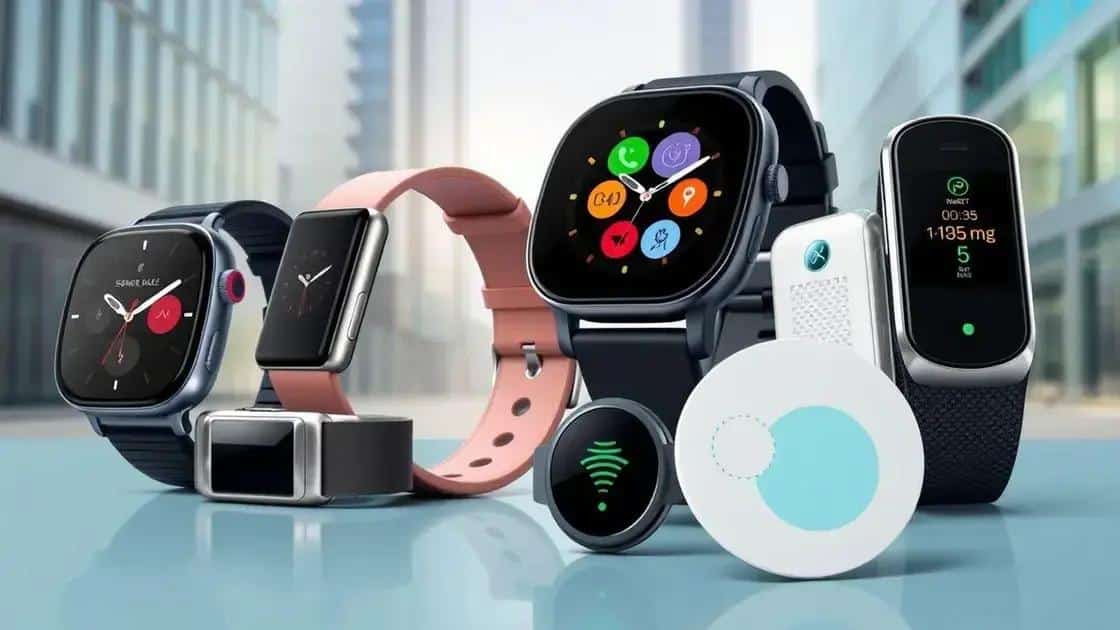Health tech advancements trends driving change in care

Health tech advancements, including telemedicine, AI, and wearable devices, are transforming patient care by enhancing accessibility, personalizing treatment plans, and enabling proactive health management.
Health tech advancements trends are not just buzzwords; they represent a significant shift in how we approach medical care and patient engagement. Have you considered how these innovations might affect your own healthcare experience?
Emerging technologies in health tech
Emerging technologies in health tech are reshaping the healthcare landscape in ways we never imagined. As new tools and innovations come to light, they significantly enhance patient care and administrative processes.
For example, advances in artificial intelligence (AI) are making diagnostics faster and more accurate. Specialists can now analyze medical images with remarkable precision, allowing for earlier detection of diseases such as cancer. Furthermore, AI algorithms can learn from vast datasets, continually improving their diagnostic capabilities.
Key Emerging Technologies
Several key technologies are at the forefront of this health tech revolution:
- Telemedicine: Provides remote consultations, making healthcare more accessible.
- Wearable devices: Track vital signs and health metrics in real-time.
- Blockchain: Enhances patient data security and interoperability.
- Robotic surgery: Increases precision and reduces recovery time.
In addition to these technologies, the integration of big data into healthcare is transformational. By analyzing large sets of health data, providers can identify trends and develop personalized treatment plans. This data-driven approach not only improves individual patient outcomes but also contributes to public health insights.
Moreover, virtual reality (VR) is finding applications in medical training and therapy. Medical students can practice complex procedures in a safe environment, while patients may find relief from pain and anxiety through therapeutic VR experiences. As these technologies evolve, they promise to make healthcare more effective and patient-focused.
Impact of telemedicine on patient care

The impact of telemedicine on patient care is profound and far-reaching. With the rise of digital health solutions, patients now enjoy better access to healthcare services than ever before.
Telemedicine allows patients to consult with healthcare providers from the comfort of their homes. This convenience reduces travel time and minimizes the stress often associated with in-person visits. For many, this means receiving timely care without the logistical challenges of traditional appointments.
Benefits of Telemedicine
Some of the key benefits include:
- Increased Accessibility: Patients in remote areas can access specialists who may not be available locally.
- Cost-Effective: Eliminates travel and associated costs, making healthcare more affordable.
- Better Monitoring: Patients with chronic illnesses can receive regular follow-up care through virtual appointments.
- Faster Response Time: Health issues can be addressed more quickly, reducing wait times for appointments.
Furthermore, telemedicine improves communication between patients and healthcare providers. Patients might feel more comfortable discussing their symptoms in a less formal setting, which can lead to more accurate diagnoses. As healthcare evolves, the integration of telemedicine into everyday practice is becoming essential.
Recent studies show that telemedicine has led to higher patient satisfaction rates. The ease of scheduling appointments and the ability to manage healthcare from home have made patients more engaged in their health journeys. Telemedicine also plays a vital role in reducing exposure to contagious illnesses, especially during pandemics.
As technology advances, we can expect telemedicine to incorporate more tools for monitoring health metrics. Devices that link directly to healthcare platforms will provide real-time data, enhancing the overall quality of care.
The role of AI in personalized medicine
The role of AI in personalized medicine is becoming increasingly important in shaping how we understand and treat diseases. By analyzing vast amounts of data, AI helps create tailored treatment plans for individual patients.
One major advantage of AI is its ability to identify patterns in genetic information. This allows healthcare providers to predict how patients will respond to specific treatments based on their unique genetic makeup. For instance, in oncology, AI can analyze tumor genomes to suggest the most effective therapies, increasing the chances of successful treatment.
Benefits of AI in Personalized Medicine
Key benefits include:
- Improved Treatment Accuracy: AI algorithms can pinpoint the most effective drugs and dosages for each patient.
- Enhanced Early Detection: AI systems can identify diseases at earlier stages, leading to better outcomes.
- Streamlined Research: Machine learning models accelerate drug development by analyzing clinical trial data swiftly.
- Patient-Centric Care: AI enables continuous monitoring of patient responses, allowing adjustments to treatment plans as needed.
Moreover, AI is revolutionizing the management of chronic diseases. For example, AI-driven applications can monitor patients with diabetes, providing real-time feedback on blood sugar levels and suggesting dietary adjustments. This allows patients to maintain better control over their health with minimal intervention from healthcare providers.
As technology continues to advance, AI’s capabilities will only expand. New algorithms will refine the precision of treatments, making healthcare more effective and personalized than ever before. The integration of AI into healthcare systems not only enhances patient outcomes but also optimizes the overall healthcare process.
Future trends in wearable health devices

The future trends in wearable health devices are set to revolutionize how we monitor our health. With technology advancing rapidly, these devices are becoming more sophisticated and user-friendly.
Wearables like smartwatches and fitness trackers are already tracking steps, heart rate, and sleep quality. As technology evolves, we can expect these devices to offer even more detailed monitoring capabilities. For instance, future wearables may include features such as real-time blood glucose monitoring, providing immediate feedback for those with diabetes. This offers patients a way to manage their health proactively.
Key Innovations on the Horizon
Several key innovations are expected to change the landscape of wearable health devices:
- Advanced Sensors: New sensors will improve accuracy in tracking various health metrics, including hydration levels and oxygen saturation.
- Integration with AI: Wearable devices will use AI to analyze user data, providing personalized health insights and recommendations.
- Improved Battery Life: Future devices will have longer-lasting batteries, allowing continuous monitoring without frequent charging.
- Telehealth Capabilities: Many wearables will integrate features that allow direct communication with healthcare providers during virtual visits.
Moreover, the design of these devices is becoming more appealing, encouraging more people to wear them regularly. Fashionable designs combined with health functionalities are likely to appeal to a wider audience, shifting the perception of wearables from medical devices to daily fashion accessories.
As wearables become even more embedded in our daily lives, their potential to gather critical health data will grow. This data can lead to significant insights for healthcare providers and patients alike, helping people take charge of their health journeys.
In summary, the advancements in health tech, particularly in areas like telemedicine, AI, and wearable devices, are truly transforming healthcare. These innovations aim to make healthcare more accessible, personalized, and effective. As we move forward, it is essential to embrace these technologies. They not only enhance patient experiences but also improve health outcomes. Staying informed about these trends will allow individuals to engage in their health journeys actively and make informed decisions.
FAQ – Frequently Asked Questions about Health Tech Advancements
How is telemedicine improving patient care?
Telemedicine provides remote access to healthcare, allowing patients to consult doctors from home, which saves time and reduces stress.
What role does AI play in personalized medicine?
AI analyzes patient data to create customized treatment plans, improving the effectiveness of healthcare for individual needs.
What are the benefits of wearable health devices?
Wearable devices monitor health metrics like heart rate and activity levels, enabling proactive health management and lifestyle adjustments.
What can we expect from future health tech trends?
Future health tech will focus on more advanced monitoring, better integration of AI, and greater accessibility to improve overall patient outcomes.






